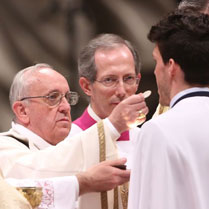Every saint has a past. When we think of St Paul’s past, we tend to think of his career persecuting Christians, and his background role in the stoning of St Stephen.
But tomorrow’s First Reading indicates that a good three years after his conversion, Paul was still causing trouble to the Church. When Paul showed up in Jerusalem, Barnabas managed to get the apostles on side — but Paul soon blew it:
Saul now started to go round with them in Jerusalem, preaching fearlessly in the name of the Lord. But after he had spoken to the Hellenists, and argued with them, they became determined to kill him. When the brothers knew, they took him to Caesarea, and sent him off from there to Tarsus.
In other words, the apostles got him out of the way. This was for Paul’s good no doubt. But the locals were probably glad to see the back of him.
The churches throughout Judaea, Galilee and Samaria were now left in peace, building themselves up, living in the fear of the Lord, and filled with the consolation of the Holy Spirit.
It wasn’t the content of Paul’s preaching which was causing trouble — he was preaching the same gospel as the apostles. It was the style of Paul’s preaching. It’s not hard to imagine: bold, abrasive, fulminating. Probably a bit like this guy:
I picked this video of Michael Voris not only because of its Australian references, but because for better or worse, it is Voris at his boldest, most abrasive, and most fulminating. And Voris is about as popular with his bishops as Paul was with his (in the pericope under consideration).
It’s almost self-evident, I think, that Voris’ opinions are not my own. If they were, this would be a very different blog. (And, let’s be honest, I’d have more readers!) But I don’t intend to “bash Voris” in this post. As a matter of fact, Voris spoke in Melbourne recently, and a friend who heard him wrote this:
People will argue that he “preaches to the converted”, and “What real effect is he having?” and “He lacks charity.” But as a result of attending the talk, I will:
1. Make a point of getting to confession ASAP.
2. Work harder, because as he well pointed out with the use of scripture, salvation only comes through suffering and sacrifice.
3. Stop patronising people who try to argue their way out of being faithful Catholics. Instead, I’ll tell them how it is and leave the rest up to them and God. Life’s too short.
I have to admit, I’m not much of a fan of the second resolution there. It smacks of semi-Pelagianism. Salvation comes through Christ, and we can’t earn it. Still, the e-mail demonstrates that Voris’ preaching (or teaching if you prefer) is a fruitful apostolate. It converts some hearts and minds — even as it infuriates and alienates others. Now I’m thinking of someone like Max Lindenman, who frankly struggles with Archbishop Chaput, and has no time for Michael Voris:
Chaput was calling on the laity to correct what he saw as the negligence of the clergy . . . He serves up red meat, but nothing too raw or bloody. A populist he may be; a demagogue he is not.
To grasp the difference, compare Chaput’s relatively modest request to the full-throated cry that emerged this past Lent from Real Catholic TV host Michael Voris. Incensed at a letter circulated by members of Earth Day Network, asking Catholic pastors to devote Easter or Divine Mercy Sunday’s homily to environmental protection, Voris denounced global warming as “a scam,” whose “intent is to limit population growth through abortion, contraception and sterilization.” For recommending the faithful give up plastic bags and incandescent light bulbs, Voris continued, the bishops who make up the USCCB “are going to have to pay for their negligence, in this life or the next.”
It may seem to some that, by praising Chaput in comparison to Voris, I am insulting His Grace with the soft bigotry of low expectations. On the contrary, I give Chaput credit for talking to Voris’ audience, if not quite in their language, then certainly in language more elevated than Voris’ but less equivocal than they’ve come to expect from bishops. Nothing could be more important today. The style of pastoral letters and Bishops’ Conference pronouncements is grave, ponderous, jargon-happy, and full of disclaimers. Is it charitable? Yes. Clear? Insofar as any statements on complex issues can be, yes. Unfortunately, to all but a few patient readers, it has a narcotic effect equal to Demerol’s.
This might have flown in the days of vellum, but no longer. If the Church is not a democracy, the communications business is. Carrying a point takes more than good intentions, formal accreditation, and elbow grease; it also takes flash. That Voris is not talking only to himself suggests that a sizable number of Catholics crave a flashier, slicker, more friction-free juncture of Church teaching and conservative politics than may in fact be possible. As Ed Kilgore points out in New Republic, evangelical Christians have televangelist James Robison to damn government as “a blasphemous substitute for God when it comes to picking ‘winners and losers.'” Catholics have Michael Voris to damn earth’s stewards into hell.
What’s my point? Well, it’s a complex issue, so there’s more than one. Here’s a few:
- It’s disingenuous to say that abrasive fulminating is unchristian and counter-productive. If you rate St Paul (and I do), then Michael Voris is in good company.
- It’s disingenuous to say that abrasive fulminating is the only way to preach the gospel. Even the apostles of the Lord baulked at Paul on occasion, and opted for more prudent methods.
- It’s disingenuous to insist on an either-or approach. Archbishop Chaput shows that a both-and approach is effective. So did St Paul.






Considering the abysmal state of Catholicism in the West today ( I personally know several “Catholics” who NEVER go to confession), a near-universally banal presentation of the Mass, almost non-existent catechesis, etc. etc., I would say Voris’s style is the cold water for the frogs about to lapse into unconsciousness in what passes for the faith today. Voris actually sounds just like most preachers I listened to in my youth.
Having said that, I was disappointed recently when Voris insisted that a certain practice was a grave sin — and then neglected to quote the Catechism, possibly because the passage concerning this disorder did not actually mention “sin”.
Jesus was pretty abrasive in the gospels. One of the corollaries of Catholic banality is that you have to “be nice”.
I didnt listen to the first readings of the Mass this evening but th Gospel. It is a beautiful Gospel. “I am the vine you are the brachnes”
I know of a certain person who writes a newsletter called “Broken Branches.” Her reasoning for calling the newsletter this was because her clients at times are very broken but never withered or dead, and together they work so that the broken branch is is healed and regrafted onto the Vine. It made me think of that tonight and what a brilliant idea it was for a newsletter (lol). Thank God for moments of illumination.
I also remembered when we lived in WA many years back and we had a patio with a huge overhead vine which ususally fruited beautifully. Now in my dumbness one year I went around to trim off pieces of vine when it was ready for fruiting and guess what this liquid sap was pouring out and I felt sad, it looked like it was crying so I went got old rags and tied the cuts to stem the “bleeding” and my husband came home to find a whole vine covering all the patio bandaged and me crying. I can still see him laughing, at my idea that it was bleeding and crying. (I was young and cute and wearing tiny shorts then-now he’d yell) but you know that year the vine didnt die but there was no fruit at all. I still remember that and I can still see the bandages and whenever I hear that Gospel I am reminded of it.
Fr John, Michael Voris calls a spade a spade and I personally think that if these American nuns stand for abortions, homosexuality and if they are wanting to be priests, they should be sent for a very very long retreat till they come back to being faithfull nuns and be obedient to the teachings of the Catholic Church.
They nuns cannot win – They are on the losing team. Jesus Christ and the Catholic Church are winners.
I tend to refer to Mark Shea as my yardstick for measuring Catholicism in the US. His blog is at http://www.patheos.com/blogs/markshea/ He is usually sensible and reliable and good friends with my US mentor Sherry Weddell (www.siena.org).
Shea was spot on in his assessment of Fr Corapi – who always looked to me – even in clerical attire – as though he was more suited to the role of night-club bouncer.
Shea was critical of Vorris’s defence of Corapi. He then defended Vorris against allegations of financial mismanagement, but took him to task on his Madrid catechesis – from which the US bishops made a point of distancing themselves. I thought Shea’s point was well made. You can read it at:
http://www.ncregister.com/blog/mark-shea/in-criticism-of-michael-voris
I think Mark Shea’s example of Vorris using the Church’s condenmation of Priscillianism to link taking communion in the hand with the Priscillian heresy is a good example of how Vorris manipulates facts for his own purposes.
Shea also warns of the anti-semitism which permeates Vorris’s work: http://www.patheos.com/blogs/markshea/2012/04/michael-voris-begins-his-work.html
I am always wary of ‘celebrity’ Catholic bloggers/media personalities. I find a useful test for their orthodoxy is whether they can laugh at themselves. Humility must be evident and they must clearly be doing God’s work and not building up their own ego.
I too enjoy a lot of Mark Shea’s work, but he’s had a few moments of his own. His sarcastic wit, sharp as it is, is often employed to cut deep into anyone that disagrees with him.
He came out with some real vitriol against Corapi when the scandal broke (which he later apologised for). To uphold him as some sort of paradigm of charity and balanced judgment would be to extend him a bit much. He can go off the deep end as much as the next guy.
Never held him up as a paradigm of virtue, but he usually reads it correctly AND he can apologise when he gets it wrong.
As Mr. Voris is not ordained nor sonitcaned to speak as an authority of the Holy Church, I will continue to receive my guidance from my pastor, and through him, my bishop. It seems to me that he walks the line of encouraging outright disobedience. If Mr. Voris is so unhappy, perhaps he should leave Catholicism and start a new career as a televangelist or Fox News reporter. That seems to be his forte.
Absolutely agree Jessica, there are some who quote Voris as if he were the Pope himself. I cannot stand Voris manner, he lacks charity and talks with an attitude that can be very patronizing. I will continue to read scripture and Church teaching as well as lessons from the early Church Fathers, but above all listen to the Pope who has been given Authority from Above.
Another problem with Voris, as he shows here by his ravigs on climate change, is his inability to distinguish the teaching of the Catholic church from the agenda of the far right of American politics. And he is not the only American who does this. They might care to listen to the pope!
Exactly right. I tend to think in the US that “Catholic Republican” is an oxymoron. I think if 10,000 people in a given country could starve to death because of climate change, if Mr. Voris discovered they all died in the state of grace, the Republicans would have been doing God’s work.
Michael Voris is a much-needed voice in the Church today, and a breath of fresh air. He gave a great interview just last week on Colleen Hammond’s radio show, where he discusses his powerful conversion and the future of his apostolate:
http://www.blogtalkradio.com/up-close/2012/05/01/up-close-with-michael-voris
A bunch of schoolgirls from a “Catholic” college attended Mass today. Not one of them genuflected. Silence from their pews instead of responses . The teacher urged them to go up to communion. I couldn’t bear to look, but another parishioner told me many of the girls didn’t have a clue what to do when they got to the priest.
And you wonder why Voris fulminates? Mass sacrilege OK with you?
“People will argue that he “preaches to the converted”, and “What real effect is he having?” and “He lacks charity.” ”
## OTOH, there is St.Paul, in 1 Cor.13:
If I speak in the tongues of men or of angels, but do not have love, I am only a resounding gong or a clanging cymbal. 2 If I have the gift of prophecy and can fathom all mysteries and all knowledge, and if I have a faith that can move mountains, but do not have love, I am nothing. 3 If I give all I possess to the poor and give over my body to hardship that I may boast, but do not have love, I gain nothing.
## Rather relevant, surely, for *all* Catholics who engage in apologetic & such like. And there’s more:
4 Love is patient, love is kind. It does not envy, it does not boast, it is not proud. 5 It does not dishonor others, it is not self-seeking, it is not easily angered, it keeps no record of wrongs. 6 Love does not delight in evil but rejoices with the truth. 7 It always protects, always trusts, always hopes, always perseveres.
8 Love never fails. But where there are prophecies, they will cease; where there are tongues, they will be stilled; where there is knowledge, it will pass away. 9 For we know in part and we prophesy in part, 10 but when completeness comes, what is in part disappears. 11 When I was a child, I talked like a child, I thought like a child, I reasoned like a child. When I became a man, I put the ways of childhood behind me. 12 For now we see only a reflection as in a mirror; then we shall see face to face. Now I know in part; then I shall know fully, even as I am fully known.
13 And now these three remain: faith, hope and love. But the greatest of these is love.
http://www.biblegateway.com/passage/?search=1+Corinthians+13&version=NIV
## STM St.Paul knew what he was talking about. If Catholicism is not charitable – what is the good of it ?
I think that to be Catholic means I really can’t be a bigot or ignorant or fly in the face of the truth. St. Paul may have had edges in what he wrote, but he wasn’t a bigot or mean. It is fun to think he stood up to the bishops in the early Church, except there weren’t any bishops when St. Paul was alive or Church as we know it today.
Tell you what, Father. The Diocese of Ballarat doesn’t have a great record in recent years. Just as charity begins at home, so should criticism.
No reflection on you, of course, but Michael Voris is a long way away and there is a lot of work to do in Ballarat to restore faith and the reputation of The Church.
Perhaps a few more Michael Voris types and a few less Gerald Ridsdales might help work the oracle so to speak.
Too true, Philip. Too true.
As a rule, I try not to criticise anyone, near or far. Not because criticism is not needed or deserved, but because there are so many others out there engaging in criticism, that anything I add is redundant.
Pax.
Thanks Father, what I wrote was certainly not intended to reflect on you. I appreciate your blog and your openness.